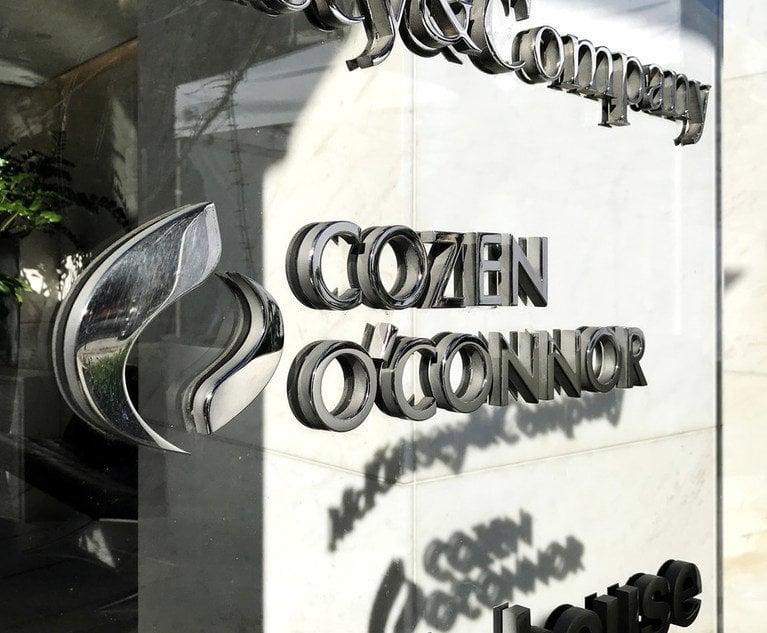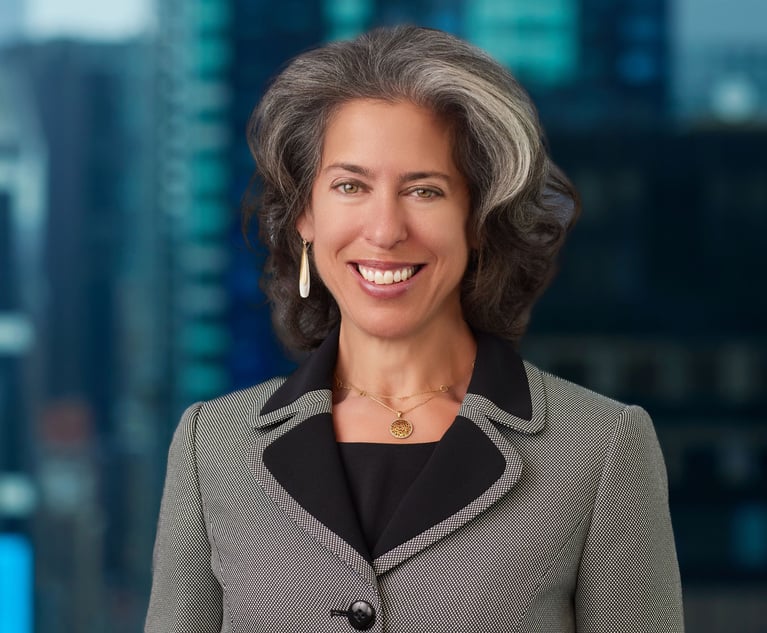 Edward M. Spiro and Christopher B. Harwood
Edward M. Spiro and Christopher B. Harwood Communications With Non-Retained Experts May Be Subject to Disclosure
"Lehrburger explained that unlike retained experts, non-retained treating physicians 'wear a cloak of independence and lack of bias,'" write Edward M. Spiro and Christopher B. Harwood.
October 14, 2024 at 12:00 PM
8 minute read
In contrast to retained testifying experts, non-retained testifying experts are experts who had personal involvement in the events underlying the litigation, such as consultants or contractors; they are fact witnesses who are also providing expert opinions. Unlike retained experts who are subject to extensive disclosure requirements, non-retained experts need only provide a disclosure of the subject on which they intend to testify and a summary of the facts and opinions they intend to provide. Compare Fed. R. Civ. P. 26(a)(2)(B) with Fed. R. Civ. P. 26(a)(2)(C). In 2010, Federal Rule of Civil Procedure 26(b) was amended to provide express protections for retained experts' draft reports and, with certain exceptions, communications with counsel, but the same protections were not expressly extended to non-retained experts. See Fed. R. Civ. P. 26(b) advisory committee's note to 2010 amendment. The Advisory Committee's notes, however, state that Rule 26(b) "does not exclude protection" for non-retained experts. Therefore, since the 2010 amendment, courts have determined whether counsels' communications with non-retained experts are discoverable on a case-by-case basis.
In Ayotte v. National Basketball Association, 2024 WL 3409027 (S.D.N.Y. July 15, 2024), Southern District Magistrate Judge Robert W. Lehrburger confronted whether counsel's communications with a specific category of non-retained experts—treating physicians—are discoverable. In Ayotte, defendant National Basketball Association (the NBA) moved to compel plaintiffs to produce communications between their counsel and a non-retained expert psychologist, Dr. Norman Goldwasser, who treated one of the plaintiffs. After explaining that key distinctions exist between treating physicians and other non-retained experts—including that treating physicians typically wear a cloak of independence even though they usually are available to one side but not the other—Lehrburger granted the NBA's motion to compel. Lehrburger reasoned that in the case of a treating physician, the need to determine the extent to which a party's attorney may have influenced the physician's testimony warrants discovery into communications between the attorney and the physician.
NOT FOR REPRINT
© 2025 ALM Global, LLC, All Rights Reserved. Request academic re-use from www.copyright.com. All other uses, submit a request to [email protected]. For more information visit Asset & Logo Licensing.
You Might Like
View All
NY Appeals Court Grants J&J's Subpoena for Talc Expert as 'Clearly Relevant'
6 minute read
Defense Counsel Can't Use Unrelated Lawsuit to Impeach Expert Witness Testimony, Judge Rules

What You Need to Know About New York Commercial Division Rule 13(c)
6 minute read
Implications of SCOTUS Expert Intent Ruling for the White-Collar Bar
9 minute readTrending Stories
- 1South Florida Attorney Charged With Aggravated Battery After Incident in Prime Rib Line
- 2'A Death Sentence for TikTok'?: Litigators and Experts Weigh Impact of Potential Ban on Creators and Data Privacy
- 3Bribery Case Against Former Lt. Gov. Brian Benjamin Is Dropped
- 4‘Extremely Disturbing’: AI Firms Face Class Action by ‘Taskers’ Exposed to Traumatic Content
- 5State Appeals Court Revives BraunHagey Lawsuit Alleging $4.2M Unlawful Wire to China
Who Got The Work
J. Brugh Lower of Gibbons has entered an appearance for industrial equipment supplier Devco Corporation in a pending trademark infringement lawsuit. The suit, accusing the defendant of selling knock-off Graco products, was filed Dec. 18 in New Jersey District Court by Rivkin Radler on behalf of Graco Inc. and Graco Minnesota. The case, assigned to U.S. District Judge Zahid N. Quraishi, is 3:24-cv-11294, Graco Inc. et al v. Devco Corporation.
Who Got The Work
Rebecca Maller-Stein and Kent A. Yalowitz of Arnold & Porter Kaye Scholer have entered their appearances for Hanaco Venture Capital and its executives, Lior Prosor and David Frankel, in a pending securities lawsuit. The action, filed on Dec. 24 in New York Southern District Court by Zell, Aron & Co. on behalf of Goldeneye Advisors, accuses the defendants of negligently and fraudulently managing the plaintiff's $1 million investment. The case, assigned to U.S. District Judge Vernon S. Broderick, is 1:24-cv-09918, Goldeneye Advisors, LLC v. Hanaco Venture Capital, Ltd. et al.
Who Got The Work
Attorneys from A&O Shearman has stepped in as defense counsel for Toronto-Dominion Bank and other defendants in a pending securities class action. The suit, filed Dec. 11 in New York Southern District Court by Bleichmar Fonti & Auld, accuses the defendants of concealing the bank's 'pervasive' deficiencies in regards to its compliance with the Bank Secrecy Act and the quality of its anti-money laundering controls. The case, assigned to U.S. District Judge Arun Subramanian, is 1:24-cv-09445, Gonzalez v. The Toronto-Dominion Bank et al.
Who Got The Work
Crown Castle International, a Pennsylvania company providing shared communications infrastructure, has turned to Luke D. Wolf of Gordon Rees Scully Mansukhani to fend off a pending breach-of-contract lawsuit. The court action, filed Nov. 25 in Michigan Eastern District Court by Hooper Hathaway PC on behalf of The Town Residences LLC, accuses Crown Castle of failing to transfer approximately $30,000 in utility payments from T-Mobile in breach of a roof-top lease and assignment agreement. The case, assigned to U.S. District Judge Susan K. Declercq, is 2:24-cv-13131, The Town Residences LLC v. T-Mobile US, Inc. et al.
Who Got The Work
Wilfred P. Coronato and Daniel M. Schwartz of McCarter & English have stepped in as defense counsel to Electrolux Home Products Inc. in a pending product liability lawsuit. The court action, filed Nov. 26 in New York Eastern District Court by Poulos Lopiccolo PC and Nagel Rice LLP on behalf of David Stern, alleges that the defendant's refrigerators’ drawers and shelving repeatedly break and fall apart within months after purchase. The case, assigned to U.S. District Judge Joan M. Azrack, is 2:24-cv-08204, Stern v. Electrolux Home Products, Inc.
Featured Firms
Law Offices of Gary Martin Hays & Associates, P.C.
(470) 294-1674
Law Offices of Mark E. Salomone
(857) 444-6468
Smith & Hassler
(713) 739-1250






